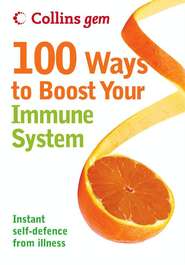По всем вопросам обращайтесь на: info@litportal.ru
(©) 2003-2024.
✖
100 Ways to Boost Your Energy
Автор
Год написания книги
2019
Настройки чтения
Размер шрифта
Высота строк
Поля
To rate your energy levels, answer the following questions:
☐ When you wake up in the morning, do you drag yourself reluctantly out of bed?
☐ Do you find yourself longing for an afternoon nap in the morning?
☐ At the end of the day, is slumping in front of the TV all that you want to do?
☐ During meetings do you easily become distracted or bored, or find it hard to keep your eyes open?
☐ Do you sometimes feel that you haven’t got the energy to get through the day?
☐ Do you fall asleep the moment your head hits the pillow?
☐ Do you often feel so wound up that it is hard to get to sleep?
☐ Does seeing or talking to friends seem like a huge effort sometimes?
☐ Is it hard to remember things or to concentrate at work?
☐ Do you find yourself getting worked up or impatient about the smallest things?
☐ Do you need caffeine or other stimulants to help you through the day?
☐ Are you susceptible to colds and other minor illnesses?
☐ Do you find it difficult to raise much enthusiasm for doing anything at all?
☐ Is it hard for you to accept or deal with change?
☐ Has it been a few weeks since you had a good laugh?
If you have ticked more than two boxes, this suggests that your energy levels are lower than they should be.
The causes of low energy: energy-drainers (#ulink_99d293db-d09e-5efa-a6b7-3e3caf7c7f5c)
Low energy is a concept that’s hard to define. Everyone will have their own idea of what being tired means, and we all feel tired once in a while; but if you feel that you have lost some of your zest for life, your energy levels are lower than they should be and you need to find out why.
Identifying what is causing your energy to dip is important because once you know what is robbing you of your vitality, you can then take steps to avoid it or manage it positively.
In most cases there is not one single cause that contributes to low energy, but a combination of several factors. Listed below are some of the most common energy-drainers including poor-quality sleep, unhealthy eating, lack of exercise, environmental factors, stress and underlying medical conditions. Review the information and use it to help you recognise your most common energy-drainers so that you can make positive changes to your diet and/or lifestyle, or seek medical advice. Then you are all set to re-energise yourself by cultivating the energy-boosting advice from page 41 onwards.
Sleep deprivation
Not getting a good night’s sleep is a common reason for low energy during the day. Between 7 and 8 hours of quality sleep a night is what most people need. Anything less than that and your immune system and your body’s battery-boosting systems suffer. This can lead to poor concentration, erratic judgement, slow reaction times, memory problems and poor physical performance, as well as mood swings and irritability.
Your sleep–waking cycle is regulated by the stimulus of sunrise and sunset, but a frantic and unhealthy lifestyle can upset your body clock, causing sleeping problems, fatigue and chronic sleep deprivation. It is certainly possible to train yourself to get by on less sleep, but during sleep both body and brain are restored, rejuvenated and re-energized. So why would you skimp on such a valuable energy-boosting resource? To find out if you are getting enough quality sleep, do any of the following apply to you?
Needing an alarm clock to wake up.
Falling asleep within 5 minutes of getting into bed.
Trouble getting out of bed in the mornings.
Drowsiness during the day and especially around 4 p.m..
Dozing off while watching TV, after a heavy lunch, or in a public place such as a meeting or at work.
Excessive yawning.
Need for caffeine and stimulants to get through the day.
If two or more items on this list apply to you, this suggests a lack of good-quality sleep. You should pay particular attention to the good sleep advice on pages 42–56.
Unhealthy diet
A well-balanced, healthy diet is essential for high energy levels. At its most basic level, what you eat and drink is the fuel that your body and brain need to function at their peak. Skimp on the quality of that fuel and you will pay the price with weight gain and low energy. Skipping breakfast, not drinking enough water, over-eating, dieting, eating on the run, consumption of caffeine and alcohol and eating a lot of refined, processed foods are the major causes of low energy levels.
Rate your diet
Do you eat breakfast every morning?
Do you eat at least 2,000 calories each day, mostly comprised of healthy, freshly prepared whole foods?
Do you grab a piece of fruit and a handful of nuts and seeds instead of a bar of chocolate to fight your midday doldrums?
Do you limit yourself to fewer than three cups of coffee every day?
Do you drink six to eight glasses of fluid every day (colas and coffee don’t count!)?
Do you make sure you eat something every couple of hours?
Do you sit down and take your time when you have a meal, chewing your food thoroughly?
More than one ‘no’ answer suggests that your diet may play a role in your energy crisis. You should therefore pay particular attention to the diet-related energy-boosting tips on pages 57–91.
The sugar blues
Almost all of your energy comes from glucose (sugar). Therefore, maintaining an even blood sugar level is essential to ensure your energy levels are healthy and your mood upbeat. The best way to control your blood sugar levels is to watch what you eat, in particular what carbohydrates you eat.
Carbohydrates are broken down into sugar, which gives your body energy. The speed at which this process occurs affects your mood, weight and energy, and your ability to cope with stress. Some carbohydrates raise your blood sugar levels quickly, while others take their time. Fast-releasing carbohydrates, such as sugar and white flour, send your blood sugar levels rocketing very quickly after eating them, so you get a burst of energy. Unfortunately this is soon followed by a rapid dip in sugar which means you feel tired and sleepy – that ‘energy trough’ – and you crave another fix all over again. Slow-releasing carbohydrates, on the other hand, such as wholegrains and vegetables, give you a steady release of sugar and energy, keeping your energy levels constant.
Eating food that is going to keep your blood sugar levels and your energy levels constant is therefore vital. The rate at which food releases glucose into your bloodstream can be measured on the glycaemic index (GI). If you haven’t got the time to work with the GI, a general rule is that the more natural and unprocessed a food is, the lower it is on the GI and the better it is for you. In a nutshell, the closer food is to its natural, unrefined state, the richer it is in nutrients and the greater its energy potential. A diet that is rich in fresh, natural wholegrains, fruits and vegetables, legumes, nuts and seeds, and low in red meat, sugar, white flour, refined and processed foods which have been stripped of their fibre, vitamin and mineral energy, fast foods and ready meals, will help you avoid the dips in energy and mood that come with fluctuating blood sugar levels.
For more advice on energy-boosting nutrients and foods, check out the tips on pages 84–5.
Stimulants
When blood sugar levels dip or fatigue sets in, many people turn to stimulants such as tea, coffee, sugary drinks, cigarettes and chocolate to keep them going. Although they can give you a temporary high, the long-term effects of stimulants are always bad.







![The Dream Dictionary from A to Z [Revised edition]: The Ultimate A–Z to Interpret the Secrets of Your Dreams](/covers_185/48653382.jpg)



